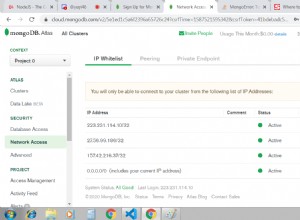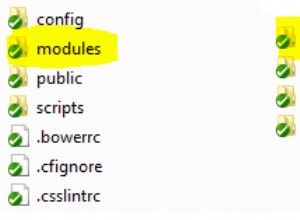Polecenie powłoki MongoDB (przed wersją 3.4) dla twojego przypadku użycia to:
db.collection.aggregate([
{
"$redact": {
"$cond": [
{ "$gt": [ "$pub-date", "$rel-date" ] },
"$$KEEP",
"$$PRUNE"
]
}
}
])
Tłumacząc to polecenie na Javę, otrzymasz:
MongoClient mongoClient = ...;
MongoCollection<Document> collection = mongoClient.getDatabase("...").getCollection("...");
List<Document> documents = collection.aggregate(Arrays.asList(
new Document("$redact", new Document("$cond",
Arrays.asList(new Document("$gt", Arrays.asList("$pub-date", "$rel-date")), "$$KEEP", "$$PRUNE"))
))).into(new ArrayList<>());
for (Document document : documents) {
System.out.println(document.toJson());
}
Biorąc pod uwagę kolekcję z tymi dokumentami ...
{
"_id" : ObjectId("5acb40d27d63b61cb002bafe"),
"title" : "WingsOfFire",
"pub-date" : ISODate("2013-10-02T00:00:00.000Z"),
"rel-date" : ISODate("2013-11-02T00:00:00.000Z")
}
{
"_id" : ObjectId("5acb662756539a6734e64e4a"),
"title" : "WingsOfSmoke",
"pub-date" : ISODate("2013-11-02T00:00:00.000Z"),
"rel-date" : ISODate("2013-10-02T00:00:00.000Z")
}
.. powyższy kod Java zostanie wydrukowany ...
{ "_id" : { "$oid" : "5acb662756539a6734e64e4a" }, "title" : "WingsOfSmoke", "pub-date" : { "$date" : 1383350400000 }, "rel-date" : { "$date" : 1380672000000 } }
... ponieważ pub-date tego dokumentu (2013-11-02T00:00:00.000Z) jest po rel-date (2013-10-02T00:00:00.000Z).
Uwaga:$where operator jest funkcjonalnie równoważny, ale użycie tego operatora wiąże się z pewnymi ograniczeniami :




